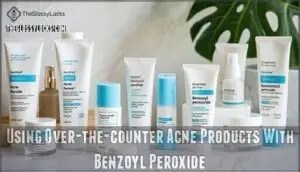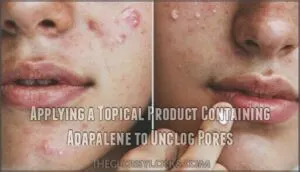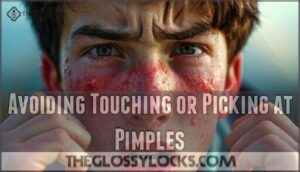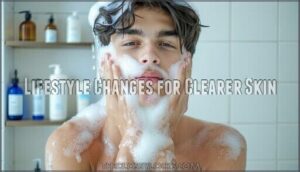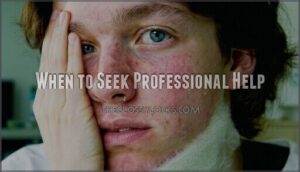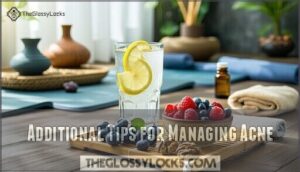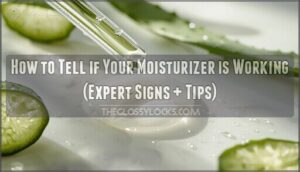This site is supported by our readers. We may earn a commission, at no cost to you, if you purchase through links.
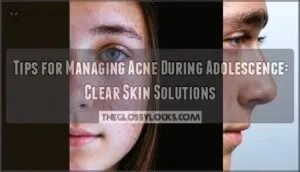
Over-the-counter products containing benzoyl peroxide or adapalene can effectively target breakouts and prevent new ones. Don’t pick at pimples, as this spreads bacteria and causes scarring.
Shower after sweating to remove oil buildup, and choose non-comedogenic makeup that won’t clog pores.
Stress management and adequate sleep also play essential roles in skin health. If acne persists despite these efforts, professional treatment options can provide more targeted solutions for stubborn breakouts.
Table Of Contents
- Key Takeaways
- Effective Home Care for Teen Acne
- Preventing Acne Flare-Ups
- Lifestyle Changes for Clearer Skin
- When to Seek Professional Help
- Additional Tips for Managing Acne
- Frequently Asked Questions (FAQs)
- How to manage teenage acne?
- What should I do if my teenager has acne breakouts?
- Should acne in teens be treated early?
- Do teenage acne treatments work?
- How do I get rid of acne?
- What are some easy skincare tips for teens?
- How to treat acne in adolescence?
- What worsens acne during adolescence?
- What is the best routine for teenage acne?
- How to get a teenager to stop picking acne?
- Conclusion
Key Takeaways
- Start with gentle, consistent cleansing – Use a mild cleanser twice daily and avoid harsh scrubbing, which worsens breakouts by irritating your skin.
- Apply proven over-the-counter treatments – Begin with 2.5% benzoyl peroxide or adapalene products, starting once daily to prevent irritation while targeting acne-causing bacteria.
- Don’t pick at pimples – Keep your hands off your face since touching spreads bacteria, creates new breakouts, and increases scarring risk.
- Maintain healthy lifestyle habits – Shower after sweating, choose non-comedogenic makeup, manage stress, and get 8-9 hours of sleep to support your skin’s natural healing process.
Effective Home Care for Teen Acne
You can effectively manage teen acne at home using proven over-the-counter treatments and gentle skincare practices.
The right combination of active ingredients and consistent care routines will help clear existing breakouts and prevent new ones from forming, which is key to effective management.
Using Over-the-counter Acne Products With Benzoyl Peroxide
When managing teenage acne, benzoyl peroxide stands out as your most reliable over-the-counter medication. This powerhouse ingredient effectively targets acne-causing bacteria while preventing antibiotic resistance, making it ideal for teen acne treatment.
Getting Started with Benzoyl Peroxide:
- Benzoyl Peroxide Strength Selection: Start with 2.5% concentration for facial application—it’s as effective as higher strengths but causes less irritation. Save 5-10% products for your back or chest if needed.
- Application Frequency Protocol: Begin with once-daily use, preferably at night. After your skin adjusts over 1-2 weeks, you can increase to twice daily if tolerated without excessive dryness.
- Expected Timeline Management: Don’t expect overnight miracles. Initial improvements typically appear within 4 weeks, but full results require 2-4 months of consistent use.
Important Considerations:
Watch for potential side-effects like dryness, redness, or peeling—these usually subside as your skin adapts. It functions as an antimicrobial agent, targeting the root cause of acne. Avoid product interactions by not combining with other acne treatments without dermatologist approval.
Washing Problem Areas Twice Daily With a Gentle Cleanser
Face-cleansing fundamentals form the cornerstone of effective teen acne treatment. Choose a mild cleanser with simple, fragrance-free ingredients that won’t disrupt your skin’s natural barrier. Popular gentle cleanser types include Cetaphil, CeraVe, and Dove formulations designed for sensitive skin.
Washing technique importance can’t be overstated—use your fingertips, not washcloths or scrubbing tools that irritate acne-prone skin. Water temperature effects matter too; lukewarm water opens pores without causing inflammation like hot water does.
Stick to twice-daily cleansing for ideal adolescent acne care. Over-washing consequences include increased oil production and irritation that worsens breakouts. Managing teenage acne requires patience and consistency rather than aggressive scrubbing.
You can find a suitable product here for this purpose. Focus on the T-zone where breakouts commonly occur, and always cleanse after sweating to maintain teenage skin health.
Applying a Topical Product Containing Adapalene to Unclog Pores
Adapalene serves as your skin’s personal renovator, promoting healthy cell turnover to prevent clogged pores.
This topical retinoid works deep within follicles to address teenage acne at its source while reducing inflammation.
Adapalene, a vitamin-A derivative, is a topical retinoid commonly used in acne treatment.
When using adapalene for best results:
- Apply a pea-sized amount to clean, dry skin once daily at night
- Start with every-other-night application to minimize initial skin irritation
- Use sunscreen daily since adapalene increases sun sensitivity
- Expect full treatment duration of 8-12 weeks for maximum product absorption benefits
Consistency transforms unclogged pores from goal to reality with this powerful retinoid treatment.
Preventing Acne Flare-Ups
Once you’ve established a solid skincare routine, preventing future breakouts becomes your next priority.
You can reduce acne flare-ups by making simple changes to your daily habits and avoiding common triggers that worsen teen acne.
Avoiding Touching or Picking at Pimples
Your hands are teenage acne’s worst enemy.
Every touch spreads bacteria and creates new breakouts where clear skin could be.
While gentle home care helps manage breakouts, touching or popping pimples creates bigger problems.
The urge to squeeze that whitehead feels irresistible, but it’s like picking at a healing wound – you’re just making things worse.
When you pick at acne, you’re basically creating an open wound that’s vulnerable to infection and scarring.
Your fingers carry bacteria and oils that can spread to other areas of your face, creating new breakouts.
The healing process gets interrupted, and what could’ve been a small blemish becomes a lasting mark.
Breaking the habit requires conscious effort and alternative coping strategies:
- Keep hands busy – Use a stress ball, fidget toy, or practice playing an instrument
- Trim nails short – Shorter nails reduce the temptation and damage potential from picking
- Apply spot treatments – Use benzoyl peroxide or salicylic acid instead of your fingers
- Practice mindfulness – Notice when you’re reaching for your face and redirect the impulse
- Get support – Ask family members to gently remind you when they notice the behavior
Remember, scarring prevention starts with habit breaking.
Your self-esteem will thank you when you avoid the infection risk and allow the natural healing process to work.
Each pimple you leave alone heals faster and cleaner than one you’ve picked at.
Showering After Activities That Cause Sweating and Oil Production
Since sweating increases sebum production and can trap bacteria in pores, Post-Workout Showers become essential for teenage acne prevention. Your skin needs immediate attention after activities that cause heavy sweating and oil production.
Sebum Buildup combined with sweat creates the perfect storm for breakouts. That’s why Shower Frequency matters – rinse off within 30 minutes of finishing your workout or activity.
| Timing | Action |
|---|---|
| Immediately after exercise | Remove sweaty clothes |
| Within 30 minutes | Take lukewarm shower |
| During shower | Use gentle, non-comedogenic cleanser |
| After shower | Pat skin dry with clean towel |
| Before bed | Apply oil-free moisturizer |
Product Choices matter too. Skip harsh scrubs that irritate already-sensitive skin. Instead, choose mild cleansers that won’t strip natural oils completely. For similar reasons, it’s important to use a sharp razor when shaving.
Skin Hydration remains vital even for oily, acne-prone skin. This teenage skincare guide emphasizes that proper acne skincare routine includes moisturizing after cleansing. These teenage skincare tips and acne prevention tips help maintain clear skin while staying active.
Lifestyle Changes for Clearer Skin
Your teenager’s daily habits can make a significant difference in managing acne breakouts. Simple changes to makeup routines, stress levels, and sleep patterns often lead to clearer, healthier skin.
Avoiding Excessive Amounts of Cosmetics That Can Clog Pores
While experimenting with makeup feels exciting during your teen years, overdoing it can worsen teenage acne by trapping oil and bacteria in your pores. Smart cosmetic choices make all the difference for acne prevention tips.
**Choose non-comedogenic products.
These cosmetic ingredients won’t clog pores, making them ideal for acne-prone skin. Look for this label when shopping for foundation, concealer, or powder.
**Keep application light and natural.
Heavy makeup layers create a breeding ground for breakouts. Instead, use thin coverage that lets your skin breathe.
**Practice thorough makeup removal.
Never sleep in makeup—it’s like asking for pimples. Use gentle, oil-free removers followed by your regular cleanser to confirm complete removal.
Consider these pore-clogging culprits to avoid:
- Picture thick, creamy foundations sitting on your skin like a heavy blanket, trapping sweat, oil, and dead skin cells underneath while blocking your pores from natural cleansing processes.
Limiting makeup and focusing on teenage skincare tips helps manage skin sensitivity while preventing cosmetics from interfering with your acne treatment routine.
Helping Your Teenager Manage and Reduce Stress
Stress identification becomes essential when managing teenage acne, as chronic stress triggers hormonal responses that increase oil production.
Research shows adolescents with high stress levels have a 23% greater chance of developing moderate-to-severe acne. Teaching your teenager to recognize stress signals—like tension, irritability, or sleep changes—helps them address issues before acne worsens.
| Stress Management | Relaxation Techniques | Support Systems |
|---|---|---|
| Deep breathing exercises | Mindfulness meditation | Family conversations |
| Time management skills | Progressive muscle relaxation | Peer support groups |
| Healthy coping strategies | Yoga or stretching | School counseling |
| Regular physical activity | Journaling practice | Trusted adult mentors |
| Stress tracking methods | Guided imagery | Mental health professionals |
Encourage your teen to practice these techniques daily. Strong support systems and emotional support substantially reduce stress-related breakouts during adolescence.
Getting Enough Sleep to Improve Skin Health
Quality sleep isn’t just about feeling refreshed – it’s your skin’s best friend during adolescence. When you skimp on Sleep Duration, your body cranks up cortisol production, triggering teenage acne flares.
During rest, your skin undergoes Cellular Repair and Hormone Regulation, while Inflammation Reduction occurs naturally. Poor sleep disrupts Skin Hydration levels, making breakouts worse.
Aim for 8-9 hours nightly to support your skincare routine. Think of sleep as your skin’s overnight maintenance crew – they can’t do their job properly if you’re constantly waking them up.
Consistent rest helps maintain healthy teenage skin and reduces skin health issues substantially. Regular exercise improves blood circulation, further enhancing skin oxygenation.
When to Seek Professional Help
While lifestyle changes help, persistent acne lasting beyond 6-8 weeks needs professional attention.
Dermatologists can prescribe stronger medications and prevent permanent scarring from severe breakouts. For severe cases, a dermatologist might suggest isotretinoin for cystic acne.
When to call a dermatologist:
- Persistent acne that doesn’t improve after 2-3 months of over-the-counter treatments
- Severe breakouts with painful cysts or nodules that resist topical medications
- Scarring concerns from inflammatory acne that could become permanent
- Treatment resistance when multiple drugstore products fail to show results
- Psychological impact causing anxiety, depression, or social withdrawal from teenage acne
Additional Tips for Managing Acne
Managing teenage acne requires a thorough approach that extends beyond basic skincare routines. These additional strategies can substantially improve your skin’s health and your overall well-being during adolescence.
Hydration Importance and Dietary Considerations play vital roles in maintaining healthy skin. While there’s no magic acne-fighting diet, certain adjustments can help:
- Drink plenty of water throughout the day to help flush toxins and maintain skin hydration
- Limit dairy and high-glycemic foods like sugary snacks that may trigger breakouts in some teens
- Include omega-3 rich foods such as fish and walnuts to support skin barrier function
- Choose antioxidant-rich fruits and vegetables to combat inflammation and promote healing
Supplement Options like zinc or vitamin D may benefit some individuals, though consultation with a healthcare provider is essential. Scar Prevention starts with avoiding picking at blemishes and using proper skincare techniques.
Mental Wellbeing substantially impacts skin health, as stress can worsen acne flare-ups. Consider stress-reduction techniques like exercise or meditation as part of your teenage acne remedies. Poor sleep quality can also exacerbate breakouts, making sufficient rest crucial.
Remember, effective teenage acne advice emphasizes patience and consistency. A well-structured skincare routine combined with healthy lifestyle choices supports both adolescent health and self-esteem during this challenging time.
Frequently Asked Questions (FAQs)
How to manage teenage acne?
Wash your face twice daily with gentle cleanser, avoid picking pimples, use non-comedogenic moisturizer, apply sunscreen, and consult a dermatologist for persistent breakouts.
What should I do if my teenager has acne breakouts?
Looking at your teen’s frustrated face in the bathroom mirror signals it’s time for action.
Start with gentle cleansing twice daily using mild products like Cetaphil.
Avoid harsh scrubbing, don’t let them pick at breakouts, and consult a dermatologist if over-the-counter treatments don’t improve things after six weeks.
Should acne in teens be treated early?
Yes, you should treat teen acne early.
Early treatment prevents scarring, reduces emotional impact, and stops mild acne from becoming severe.
Most treatments take 4-8 weeks to show results, so starting sooner helps your teenager’s confidence and skin health.
Do teenage acne treatments work?
Like a garden blooming after rain, teenage acne treatments absolutely work when you’re patient and consistent. Most topical treatments show results within 4-8 weeks, clearing pores and reducing bacteria effectively.
How do I get rid of acne?
Start with a gentle cleanser twice daily, use non-comedogenic moisturizer, and apply treatments containing salicylic acid or benzoyl peroxide.
Avoid picking at breakouts and consult a dermatologist if over-the-counter options don’t improve your skin after 6-8 weeks of consistent use, which may require dermatologist consultation.
What are some easy skincare tips for teens?
Wash your face twice daily with a gentle cleanser, avoid picking at pimples, and use oil-free moisturizer. Don’t over-wash or scrub harshly, as this worsens acne by irritating your skin.
How to treat acne in adolescence?
You’ll need gentle cleansers, topical treatments like benzoyl peroxide or salicylic acid, and consistency. For severe cases, consult a dermatologist for prescription medications or specialized treatments.
What worsens acne during adolescence?
Several factors worsen acne during adolescence. Harsh scrubbing irritates your skin, while picking at pimples causes scarring and infection. Stress, excessive sun exposure, and oil-based cosmetics also aggravate breakouts substantially.
What is the best routine for teenage acne?
Your acne-fighting routine shouldn’t be rocket science.
Cleanse twice daily with gentle, non-comedogenic products, apply targeted treatments like salicylic acid or benzoyl peroxide.
Moisturize with oil-free formulas, and always wear sunscreen.
How to get a teenager to stop picking acne?
Create clear consequences for picking—like removing mirrors from their room temporarily—and help them find alternatives like stress balls or fidget toys.
Remind them that picking delays healing and increases scarring risk.
Conclusion
Achieving clear skin becomes a journey of patience and persistence, much like tending a garden that requires daily care to flourish.
These tips for managing acne during adolescence provide a foundation for healthy skin habits that extend beyond your teenage years.
Remember that consistency matters more than perfection—stick to your routine even when you don’t see immediate results.
Your skin will thank you for the gentle, persistent care you provide today.
- https://www.healthychildren.org/English/health-issues/conditions/skin/Pages/What-Causes-Acne.aspx
- https://kidshealth.org/en/teens/prevent-acne.html
- https://www.nhs.uk/conditions/acne/
- https://www.cerave.com/skin-smarts/skin-concerns/acne/teenage-acne-skincare-routine
- https://www.frontiersin.org/journals/medicine/articles/10.3389/fmed.2023.1152391/full

